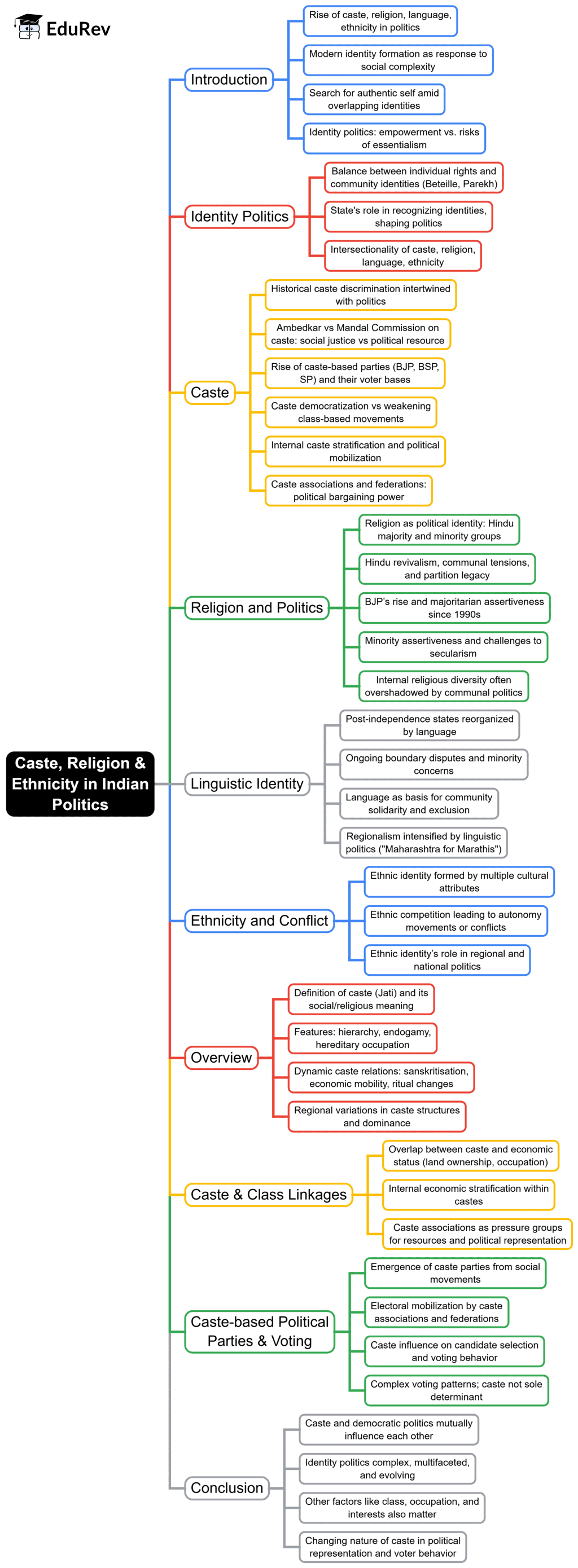UPSC Exam > UPSC Notes > PSIR Optional for UPSC > Mind Map: Caste, Religion and Ethnicity in Indian Politics
Mind Map: Caste, Religion and Ethnicity in Indian Politics | PSIR Optional for UPSC PDF Download

The document Mind Map: Caste, Religion and Ethnicity in Indian Politics | PSIR Optional for UPSC is a part of the UPSC Course PSIR Optional for UPSC.
All you need of UPSC at this link: UPSC
|
173 videos|574 docs|148 tests
|
FAQs on Mind Map: Caste, Religion and Ethnicity in Indian Politics - PSIR Optional for UPSC
| 1. How do caste dynamics influence electoral politics in India? |  |
Ans. Caste dynamics play a crucial role in shaping electoral politics in India. Political parties often rely on caste-based identities to mobilize voters. Different castes have distinct voting patterns, and parties may field candidates from specific castes to appeal to those communities. Additionally, caste-based alliances and coalitions are formed to enhance electoral prospects. This influence is evident in regional politics, where certain castes dominate and dictate the political landscape.
| 2. What is the role of religion in Indian political discourse? |  |
Ans. Religion significantly shapes political discourse in India, often influencing party ideologies and voter behavior. Political parties may align themselves with specific religious communities to garner support. Issues such as communalism, secularism, and minority rights are central to political debates. The interplay between religion and politics can lead to polarization, impacting social harmony and governance.
| 3. How does ethnicity intersect with caste and religion in Indian politics? |  |
Ans. Ethnicity intersects with caste and religion in Indian politics by adding another layer of identity that influences political affiliations and conflicts. Ethnic groups often have their own historical grievances and aspirations, which can align or clash with caste and religious identities. Political mobilization around ethnic lines can lead to the formation of regional parties and movements that seek to address specific ethnic concerns while navigating the complexities of caste and religion.
| 4. What impact does caste-based reservation have on Indian politics? |  |
Ans. Caste-based reservation has a profound impact on Indian politics by shaping both policy and electoral strategies. The reservation system aims to uplift historically marginalized communities, leading to increased political representation. However, it also generates debate and controversy, with arguments about fairness and meritocracy. Political parties often leverage the issue of reservation to consolidate votes from specific castes, influencing party platforms and campaign strategies.
| 5. How can understanding caste, religion, and ethnicity contribute to better governance in India? |  |
Ans. Understanding the interplay of caste, religion, and ethnicity can lead to more inclusive and effective governance in India. Policymakers who recognize these dynamics can design targeted interventions that address the unique needs of diverse communities. This awareness can help in fostering social cohesion, reducing conflict, and ensuring equitable resource distribution. Ultimately, a nuanced understanding of these identities can enhance democratic processes and promote sustainable development.
Related Searches




















